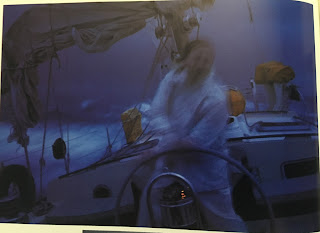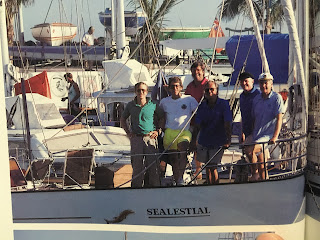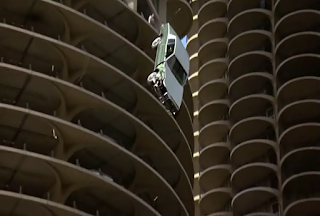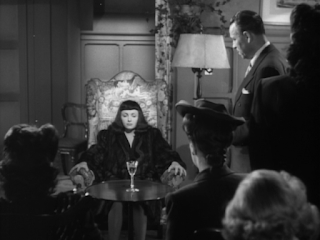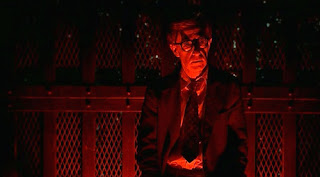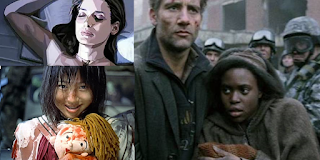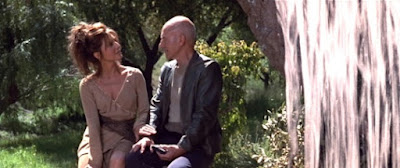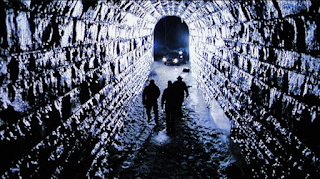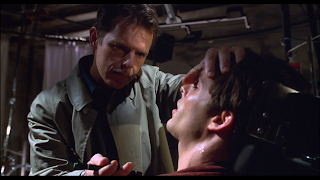Cruising Speed covers seven days and nights in the life of William F. Buckley, Jr. at the beginning of December, 1970.
During a recent episode of The Great Books podcast, the guest Richard Brookhiser described it as a vivid portal to both Bill and to his era, an era not so remote that we can’t recognize it but one that is, alas, gone completely. By that he refers to Bill’s signature program, Firing Line, and he is correct. Somewhere around the time of the McLaughlin Group, which Brookhiser suggests was the hinge to the cable news variety, the type of program that Firing Line was – and here I do not mean conservative or liberal but adult-conversation structured intentionally around points being made in bursts longer than commercials (or Twitter character limits) allowed. And everyone - left and right - came on Firing Line; everyone talked to Bill – began to disappear.
Now, the Great Books is a National Review podcast, and National Review was the magazine founded by WFBJR in 1955, so of course sooner or later they’d cover it, right? Does that make it, actually, great? Fair question. The distinguished New England novelist and college professor Mary Ellen Chase told students of Smith College English majors a century ago that in judging a work of literature one should ask what the author had in mind to do, how successfully he brought it off, and finally, whether the project had been worth doing in the first place.
As with the TV and debate standards and practices of Bill’s era, these ideas of how to quantify a work of literature (and of course Cruising Speed is not a novel but what its byline pointedly states: a documentary, but stick with me here) seem to increasingly belong only to one remote era of America’s past. But I’d say it passes the test pretty well.
That said, I’m not sure I’d make this the first Buckley I’d recommend to someone. It’s easy to picture someone reading only the first page (“...my Rowley, her Pepper and Foo, the last an ill-tempered, eccentric Pekingese, a gift from Martin Liebman, one of the two or three people I would forgive the giving of a dog as a Christmas present, perhaps the only friend I’d forgive the giving of Foo. I named horrible Foo "Foo" making the point firmly to call him “Fu” would be inexcusably bad taste. Pepper is a beautiful cavalier King Charles Spaniel, who loves Pat and naught else in this world, which I take unkindly. Rowley is also a Cavalier, a Blenheim, quite simply the most beautiful, the most engaging dog I ever saw, his only fault being that of Browning’s Last Duchess, who smiles as sweetly for the gardener as for the Duke”) and slowly making the faces Bodie and Poot make in that one episode of The Wire when they leave the broadcast reach of familiar Baltimore radio stations and hear for the first time the alien cadence of Garrison Keillor.
But for the more seasoned Buckley reader – or for fans of this era of New York City – there are many delights to be had here. I’ll give the barest of bones below.
Monday
The book begins with piling into the car and heading to NYC. The Buckleys have their family home in Connecticut and their place on 73rd st. in the City, to which Pat proceeds while Bill heads to Broadway to tape an episode of Firing Line (Jerris Leonard, Jeff Greenfield - I couldn't find it on first pass but have at it.). Then to his physical therapist’s, then back to 73rd for a private concert from Rosalyn Tureck. (Bill was devoted to her.) Then off to the Russian Tea Room, “then a cab, a little reading, and to sleep.”
Tuesday
A couple of hours correspondence in the morning, then off to the doctor, then an editorial conference at National Review HQ with the editors (James Burnham – a personal favorite – et al). They all go to lunch in the glow of brother Jim’s recent electoral victory. (Jim Buckley was elected junior Senator from New York in 1970).
The rest of the afternoon seems to be telephone meetings in various languages with various (and fascinating) people. Then it’s dinner with the editors at Paone's and then off to the Filmore East to hear Virgil Fox.
“Virgil Fox comes on and speaks a minute or two before each number, attempting to attract the audience to God by stressing the common wavelengths on which He and Bach operate. The performance was god-awful, because Fox clearly wants to impress the kids by a) the noise and b) his virtuosity. At one point during a prelude I am tempted to rise solemnly, commandeer a shotgun, and advise Fox, preferably in imperious German (…) that if he does not release the goddamn vox humana which is ooo-ing, ahh-ing, ee-ing the music where Bach clearly intended something closer to a bel canto, I shall simply have to blow his head off (...) After the intermission, Fox introduces the Passacaglia at Wagnerian length, almost but not quite to the point of causing mutiny in the audience whose stirrings become discernible after the fourth or fifth minute. The maestro then turns and snows them with his dexterity which is undeniable, the problem being it will be ten years before I can appreciate again the music he has played so overloud, so throbby so plucky-wucky the portamentos, so Phil Spitalny the cantanados.
(Does this performance exist anywhere? Answer yes. I doubt Bill bought the album when it came out. Who is Phil Spitalny? Answer here.)
Wednesday
J. Dan Mahoney in morning, then writing columns, then putting the finishing touches on the magazine together. This takes all day and would normally terminate with drinks at five o’clock, but Bill’s off to Princeton, where he handles more correspondence on the drive, including with Daniel Moynihan (who ends up unseating his brother from the Senate seat in 1976), and this bit:
The MHS! Nice. I was a member for many years and still have (and listen appreciatively to) their discs. I did not know this little connection to Bill existed in my life through our respective music collections. Just last month I finished collecting all of the MHS Haydn there is to get, crossing off a bucket list item (albeit a fairly easy one) of many years running.
At Princeton there’s a dinner and a speech and then it’s back to NYC where he turns off the late show to as not to wake Pat, which of course wakes her.
Thursday
On the road early to the University of Bridgeport for a lunch and a debate with Dick Gregory. This prompts some of the more reflective passages of the novel, remembering similar debates with Howard Zinn and James Baldwin. When describing the rudeness of the students at the campuses that ask him to speak, he stops to consider whether his offense and brooding over one such incident (where he spoke from the heart and was congratulated after for “snowing the audience”) was from vanity or whether they offend him as “ruptures of the membrane of social affections that makes it possible for people to live together, people by definition being people who disagree on questions trivial and substantial.”
This is something I relate to strongly. Look, no secret - I left the left years ago, not because I suddenly saw the wisdom or appeal in being a Right Wing Nut Job or a sudden desire for mass unfriendings and social media abuse, but because of stuff like this, the whole Flying Spaghetti Monster-ification of discourse both public and private. The internalization and subsequent externalization/projection of unreasonable and goddamn unAmerican attitudes. Live and let live and mutual respect for space to do it became, what, white supremacy over the past twenty years? That's just 2021 - who knows what it will be recharacterized as, this time next year. Anyway, disagreements over policy, religion, family, just about everything - these things are going to happen. You can't police people into conformity, and it's a wretched impulse to begin with, whether the intentions are Marxist or Lutheran (or both). Look to those who are gaming "the public square" to ghettoize (or worse) any narrative in competition with theirs and you have your culprits, ladies and gentlemen, on the left, right, or indifferent. Back to the show.
Reflecting on the extremes of the left and the right prompts him to reflect on an absolutely fascinating night he spent at Prof. Revilo’s house. Revilo was once an ally of Buckley’s, but he stayed on the John Birchier side of conservativism (and how!) when Buckley et al. put National Review squarely and pointedly against it. Still as anti-communist as necessary, just hey, enough with the batshit. Always a good philosophy, where I'm standing. Anyway here’s one for King 11/22/63 fans. Once the above schism happened, Revilo felt compelled to excommunicate Bill and was explaining to him one night why he could longer can see him socially (“I have no way of knowing whether or not you are an agent of the communist party.”) Bill was listening, politely, or trying to, as he kept getting distracted from strange noises from the kitchen.
“I discovered that the scramble was the voice of General Edwin Walker. The General had recently been brought back from Europe for excessive and undifferentiated anti-communism, and soon embarrassed the entire conservative community, which had presumptively backed him, when, interrogated by a Senate committee, he betrayed a Birchite ignorance of any distinctions, shored up by his indecipherably documented certainty that everyone in sight was an agent of the Communist Party. Well, General Walker was now running for governor of Texas, and the commotion in the kitchen was caused by the arrival at Revilo’s of a tape of Walker’s most recent speech, which (his followers) were coming in, one by one, to duplicate on their own tape recorders. And of course the way to record fast in order to facilitate the traffic is at super high speed which when you play it to listen to will then switch back at normal speed.”
These books are filled with wonderful glances at and puzzled reactions to emergent twentieth-century tech like that. Anyway, I could so easily picture the scene as if in a movie. I'd put Revilo in an armchair by a roaring fire, explaining in Stentorian tones why he can't be Bill's friend anymore, with the flames casting ominous shadows and Walker's demagoguery playing at chipmunk speed from the shadows.
“If you are prepared to believe that the in-guys are presumably on your side, then you bemoan their delinquencies as you would aberrations, rather than as delinquencies that issue out of their flawed understanding of reality. Thus a Democratic administration that signs a conciliatory agreement with Laos is presumed to be weakminded, critically short of anti-Communist corpuscles, while a Republican administration that signs a peace with North Korea is assumed to have got the best deal one could hope to get."
Then it’s off to dinner, then reading til 1 am, waking Pat again when shutting off the late late show.
Friday
Some business with the Starr Broadcasting Company (defunct now - Bill was out by the late 70s), then a stage debate with Ramsey Clark at the Waldorf, then over to the Newsweek Building where he had an office that he'd use six or seven times a year to write his columns. Then to Maxwell’s Plum for lunch. Dinner that night with Rosalyn Tureck and friends at the apartment on 73rd.
Saturday and Sunday
“We sleep late and send out for the New York Times.”
Reading and lazing and then a lunch date with Otto Van Hapsburg, the heir to the throne of Austria and Hungary (the claim of which he had to renounce in order to re-enter the country after the war). Tantalizingly, this ends with an invitation for Buckley to join a small organization to discuss deeply and off the record all manner of public affairs. Could this be, perhaps, the Bilderbergers? Buckley was already a member of Skull and Bones, ex-CIA, and a member of Bohemian Grove. Why not add more to drive Alex Jones really crazy…!
At night, dinner at La Seine with Pat (where we catch a glimpse of her argumentative side, especially after her "supernumerary" martini) and friends, including Truman Capote and the daughter of the recently-dead-by-suicide publisher of the Washington Post. He reflects on the column he wrote of the affair – a there but for the grace of God go all of us affair – but there’s a certain frostiness in the air and he reflects on how a late need for a column/ deadline combined with turning on the radio and hearing a news item (“The publisher of the Washington Post dead by suicide”) might result in personal harm to a young woman he’s never met nor wished to harm at all. It’s an interesting moment. I wish more journalists – especially nowadays, where it seems there’s relentless pressure TO cause personal harm – were this reflective.
Then it’s off to the Sanctuary on the West Side then home. Sunday is more correspondence, mass, remembrances of and at Yale, lunch at Maxwell Plum’s again, and then a viewing of Gimme Shelter, which allows for some wonderful “wow, what the hell are the kids doing?” observations. But this last chapter also contains the entire text of a speech (and a good one) as well as some sailing preparations (interesting in light of the Personal Adventures on Land and at Sea framing we’re doing) and Big Thoughts on life, work, the spirit, and the flesh.
It’s tempting to describe such a project as seven days in the Ritalin-fueled life of WFBJR. I can picture it as an old movie trailer: WITNESS! Him answer his correspondence! MARVEL! At the breakneck pace of his schedule! ABSORB! Asides on friendship and anecdotes on interesting people! Etc. etc.
Before we go, there’s a funny story on this blurb:
His war of words with Arthur Schlesinger, Jr. over the years is a lot of fun stuff. I'll cover it more when I get to the WFBJR collections, but this was something Schlesinger said, unguardedly, in a debate with Bill, and Bill plucked it out of context for this quote on the back. I love that kind of pranking. (Schlesinger was appropriately irate and of course threatened litigation.)





















